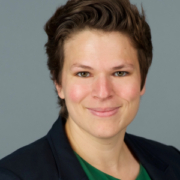Mover and Shaker Sylvia Favretto, Counsel, Financial Institutions Advisory & Financial Regulatory Group, Shearman & Sterling LLP
 “To be successful, you must present yourself as a reliable, responsive and knowledgeable member of the team,” says Shearman & Sterling’s Sylvia Favretto. “No matter how intelligent you are, or your level of expertise in your field, it will be difficult to advance in your legal career if you can’t project to your clients and colleagues self-assuredness and confidence in your abilities.” She adds that team members and clients alike need to know that they can depend on you for timely, accurate advice.
“To be successful, you must present yourself as a reliable, responsive and knowledgeable member of the team,” says Shearman & Sterling’s Sylvia Favretto. “No matter how intelligent you are, or your level of expertise in your field, it will be difficult to advance in your legal career if you can’t project to your clients and colleagues self-assuredness and confidence in your abilities.” She adds that team members and clients alike need to know that they can depend on you for timely, accurate advice.
Finding the Right Fit Straight Out of Law School
After completing her undergraduate degree at Duke University, Favretto attended law school at the University of Michigan during which she served as a summer associate for Shearman, splitting time between the firm’s London and New York offices. In the fall of 2006 she started in the New York office in the leveraged finance practice group, ultimately transitioning to her current position in the financial advisory regulatory group. There, she finds she is constantly learning something new due to the dynamic nature of the group and its subject matter. “There is often not a large body of precedent for complying with new rules and regulations, so helping financial institutions adapt to the changing regulatory environment is both challenging and stimulating,” she says.
During law school Favretto had heard the common lore that the hours at big firms are intense and that associates would be living at the office with their whole lives revolving around work. “I had heard so many stories and warnings, that my expectation was that I would put my head down and work hard and that would be the primary way that I could add value and advance in my career,” she says. However, she found that while part of that is true, she soon learned that there is much more to being a successful lawyer — the key was not only to work hard and produce great results but also to network and market oneself both internally and externally.
Throughout her tenure at Shearman & Sterling she has been involved in its women’s network and has found it to be valuable not only for the internal training and mentoring but for the client and alumni events they organize and participate in. These events provide the opportunity for Favretto to meaningfully engage with successful women in law and industry with whom she wouldn’t necessarily otherwise interact.
Finding Meaning in Mentoring
Along the way, Favretto says she has been fortunate to have fantastic female mentors at Shearman, both informal and formal. “What was most valuable — and surprising to me — was that my mentors truly cared about my success and advancement,” she says. “They were generous with their time and had a genuine desire to invest in the careers of their mentees, rather than just doing so in order to check a mentoring ‘box.’ It really made a strong impression.” Favretto was surprised to discover just how meaningful mentoring relationships could be, and strives to serve in a similar capacity to associates in her firm.
Balancing Work and Life
Favretto’s two-year-old son, whom she calls “the light of her life,” has made her more efficient in her work. She’s learned to take a broader view of the concept of “work-life balance” by assessing what she achieves over the span of a week or month, rather than looking at any one single day. She says that when her son was first born, she wasn’t sure how she would be able to handle it all, but that it’s something she’s learned by doing.
“It’s tricky when you have a job you want to return to and excel at, yet you don’t want to neglect other, equally important aspects of your life. It’s difficult to plot out in advance how precisely you’ll achieve balance between your professional and personal life, but every person’s situation is different, and I believe everyone can find a balanced path forward that works for them.”











